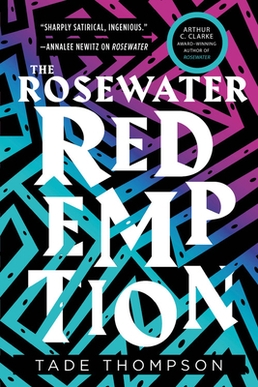The Ditmar Award is Australia's oldest and best-known science fiction, fantasy and horror award, presented annually since 1969, usually at the Australian "Natcon". The historical nominations and results of the Award follow.

Tansy Rayner Roberts is an Australian fantasy writer. Her short stories have been published in a variety of genre magazines, including Andromeda Spaceways Inflight Magazine and Aurealis. She also writes crime fiction as Livia Day.

Jason Nahrung is an Australian horror author and journalist who lives in Melbourne with his partner Kirstyn McDermott. Nahrung has previously written for The Courier-Mail newspaper in Queensland, with a special interest in speculative fiction and horror-related topics. He was co-winner the 2005 William Atheling Jnr award for Criticism or Review. His first novel, The Darkness Within, was published in June 2007 by Hachette Livre in Australia. Nahrung has also published some horror and speculative fiction short stories.
The William Atheling Jr. Award for Criticism or Review are a Special Category under the Ditmar Awards. "The Athelings", as they are known for short, are awarded for excellence in science fiction and speculative criticism, and were named for the pseudonym used by James Blish for his critical writing.

The following outline is provided as an overview of and topical guide to science fiction:
Neon Yang, formerly JY Yang, is a Singaporean writer of English-language speculative fiction best known for the Tensorate series of novellas published by Tor.com, which have been finalists for the Hugo Award, Locus Award, Nebula Award, World Fantasy Award, Lambda Literary Award, British Fantasy Award, and Kitschie Award. The first novella in the series, The Black Tides of Heaven, was named one of the "100 Best Fantasy Books of All Time" by Time magazine. Their debut novel, The Genesis of Misery, the first book in The Nullvoid Chronicles, was published in 2022 by Tor Books, received a starred review from Publishers Weekly, received a nomination for the 2022 Goodreads Choice Award for Science Fiction, and was a Finalist for the 2023 Locus Award for Best First Novel and 2023 Compton Crook Award.
Tade Thompson FRSL is a British-born Nigerian psychiatrist and writer of Yoruba descent. He is best known for his 2016 science fiction novel Rosewater, which won a Nommo Award and Arthur C. Clarke Award.
AnnaLinden Weller, better known under her pen name Arkady Martine, is an American author of science fiction literature. Her first novels A Memory Called Empire (2019) and A Desolation Called Peace (2021), which form the Teixcalaan series, each won the Hugo Award for Best Novel.

The Murders of Molly Southbourne is a 2017 horror novella by Nigerian-British writer Tade Thompson. The plot covers the life of Molly Southbourne, who is afflicted by a mysterious condition. Every time she bleeds, a doppelgänger will grow from her blood and attempt to kill her. The novel has two sequels: The Survival of Molly Southbourne (2019) and The Legacy of Molly Southbourne (2022).

Suyi Davies Okungbowa is a Nigerian fantasy, science fiction and speculative writer and academic. He is the author of various novels, including The Nameless Republic epic fantasy trilogy, beginning with Son of the Storm. His debut was the godpunk fantasy novel, David Mogo, Godhunter. He has also written works for younger readers under the author name Suyi Davies, including Minecraft: The Haven Trials. His work is heavily influenced by the histories and cultures of West Africa and Nigeria, and discusses themes of identity, challenging difference and finding home. WIRED referred to him as "one of the most promising new voices coterie of African SFF writers." He is an Assistant Professor of Creative Writing at the University of Ottawa.

Tochi Onyebuchi is an American science fiction and fantasy writer and former civil rights lawyer. His 2020 novella, Riot Baby, received an Alex Award from the American Library Association and the World Fantasy Award in 2021. He is known for incorporating civil rights and Afrofuturism into his stories and novels.

The Nommo Awards are literary awards presented by The African Speculative Fiction Society. The awards recognize works of speculative fiction by Africans, defined as "science fiction, fantasy, stories of magic and traditional belief, alternative histories, horror and strange stuff that might not fit in anywhere else."
Africanfuturism is a cultural aesthetic and philosophy of science that centers on the fusion of African culture, history, mythology, point of view, with technology based in Africa and not limiting to the diaspora. It was coined by Nigerian American writer Nnedi Okorafor in 2019 in a blog post as a single word. Nnedi Okorafor defines Africanfuturism as a sub-category of science fiction that is "directly rooted in African culture, history, mythology and point-of-view..and...does not privilege or center the West," is centered with optimistic "visions in the future," and is written by "people of African descent" while rooted in the African continent. As such its center is African, often does extend upon the continent of Africa, and includes the Black diaspora, including fantasy that is set in the future, making a narrative "more science fiction than fantasy" and typically has mystical elements. It is different from Afrofuturism, which focuses mainly on the African diaspora, particularly the United States. Works of Africanfuturism include science fiction, fantasy, alternate history, horror and magic realism.
Oghenechovwe Donald Ekpeki is a Nigerian speculative fiction writer, editor and publisher who is the first African-born Black author to win a Nebula Award. He's also received a World Fantasy Award, British Fantasy Award, Otherwise Award, and two Nommo Awards along with being a multi-time finalist for a number of other honors including the Hugo Award.

Rosewater is a 2016 science fiction novel by Nigerian-British writer Tade Thompson. It was followed by two sequels: The Rosewater Insurrection and The Rosewater Redemption which were published in 2019 simultaneously. The novel won the inaugural Nommo Award as well as the 2019 Arthur C. Clarke Award.
Oluwole Talabi is a Nigerian speculative fiction writer, engineer, and editor, who is considered among the Third Generation of Nigerian Writers. His works include short stories, anthologies Lights Out: Resurrection (2016), Africanfuturism: An Anthology (2020), These Words Expose Us: An Anthology (2014), Incomplete Solutions (2019), novels Shigidi and the Brass Head of Obalufon (2023), and Convergence Problems (2024). He was described in the Scientific American as "an author who blends transhumanism and the Turing test".
Vigil is a 2016 urban fantasy novel by Angela Slatter. It is the first novel in the Verity Fassbinder series.

The Rosewater Insurrection is a 2019 science fiction novel by Tade Thompson. It is the second book in the Wormwood Trilogy. It follows 2016's Rosewater and was followed by The Rosewater Redemption, also published in 2019.

The Rosewater Redemption is a 2019 science fiction novel by Tade Thompson. It is the final book in the Wormwood trilogy, preceded by Rosewater (2016) and The Rosewater Insurrection (2019). It was a finalist for the 2020 Locus Award for Best Science Fiction Novel.

The Daughter of Doctor Moreau is a 2022 novel by Silvia Moreno-Garcia. It is loosely based on The Island of Doctor Moreau, an 1896 novel by H.G. Wells. The novel received critical acclaim, with reviewers particularly praising its exploration of feminism and colonialism. The novel received nominations for the 2023 Hugo Award for Best Novel and 2023 Locus Award for Best Science Fiction Novel.










